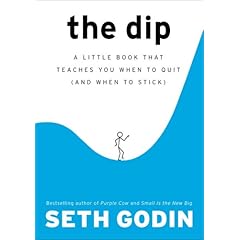The Dip
by Seth Godin

ISBN: 1591841666
From the blogging sphere I came across one of the most popular marketing gurus – Seth Godin. I have read posts online, so when I walked in Barnes and Noble and saw a little cute blue book with his name on it, it immediately drew my attention. I read those 70 pages on the spot, and then bought the book for home. Its one of those treasure books, that if you start underlining you will have to underline half the stuff.
Every project starts with excitement, energy, and resources. However, as it get progressively difficult, long, and tiresome you experience the dip, where people naturally feel like quitting. The Book is about how you should recognize that pushing a little harder to get to the ultimate returns is what separates the superstars from the rest.
“Winners never quit and quitters never win” We have all heard that expression. Well, Seth Godin explains that there is nothing worse than this advice, because our success depends on the ability to quit the right things at the right moment, and stick to the ones that payoff.
One of my favorite examples is the weight lifting example. When you exercise, your muscle gets tired. Only the last few seconds when the muscle starts hurting is when it actually grows. The problem is that most people naturally quit when pain appears, so they do all the work but get none of the benefits.
One of the best advices that I have heard is the following quotation:
Decide before the race the conditions that will cause you to stop and drop out [of the marathon]. You don’t want to be out there saying, “Well gee, my leg hurts, I’m a little dehydrated, I’m sleepy, I’m tired, and it’s cold and windy.” And talk yourself into quitting. If you are making a decision based on how you feel at the moment, you will probably make the wrong decision.
One other thing that loved — Seth says at one point that almost everything we learn in school is wrong, but the wrongest things of all is the notion that we need to be well rounded. You can only be the best if you quit the rest of the things you are doing, simply because you don’t have enough resources to be the best in anything you do.
So many things in this book can change your life. Buy it. Link to Amazon’s The Dip.
